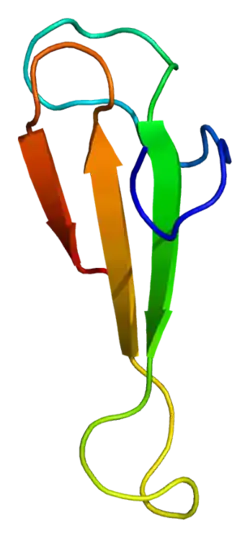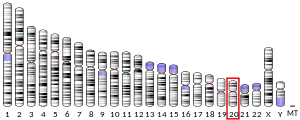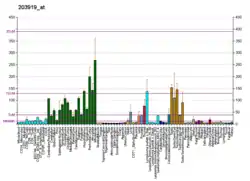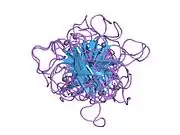TCEA2
Transcription elongation factor A protein 2 is a protein that in humans is encoded by the TCEA2 gene.[5][6][7]
| TCEA2 | |||||||||||||||||||||||||||||||||||||||||||||||||||
|---|---|---|---|---|---|---|---|---|---|---|---|---|---|---|---|---|---|---|---|---|---|---|---|---|---|---|---|---|---|---|---|---|---|---|---|---|---|---|---|---|---|---|---|---|---|---|---|---|---|---|---|
 | |||||||||||||||||||||||||||||||||||||||||||||||||||
| |||||||||||||||||||||||||||||||||||||||||||||||||||
| Identifiers | |||||||||||||||||||||||||||||||||||||||||||||||||||
| Aliases | TCEA2, TFIIS, transcription elongation factor A2 | ||||||||||||||||||||||||||||||||||||||||||||||||||
| External IDs | OMIM: 604784 MGI: 107368 HomoloGene: 68304 GeneCards: TCEA2 | ||||||||||||||||||||||||||||||||||||||||||||||||||
| |||||||||||||||||||||||||||||||||||||||||||||||||||
| |||||||||||||||||||||||||||||||||||||||||||||||||||
| |||||||||||||||||||||||||||||||||||||||||||||||||||
| |||||||||||||||||||||||||||||||||||||||||||||||||||
| |||||||||||||||||||||||||||||||||||||||||||||||||||
| Wikidata | |||||||||||||||||||||||||||||||||||||||||||||||||||
| |||||||||||||||||||||||||||||||||||||||||||||||||||
Function
The protein encoded by this gene is found in the nucleus, where it functions as an SII class transcription elongation factor. Elongation factors in this class are responsible for releasing RNA polymerase II ternary complexes from transcriptional arrest at template-encoded arresting sites. The encoded protein has been shown to interact with general transcription factor IIB, a basal transcription factor. Two transcript variants encoding different isoforms have been found for this gene.[7]
References
- GRCh38: Ensembl release 89: ENSG00000171703 - Ensembl, May 2017
- GRCm38: Ensembl release 89: ENSMUSG00000059540 - Ensembl, May 2017
- "Human PubMed Reference:". National Center for Biotechnology Information, U.S. National Library of Medicine.
- "Mouse PubMed Reference:". National Center for Biotechnology Information, U.S. National Library of Medicine.
- Weaver ZA, Kane CM (Dec 1997). "Genomic characterization of a testis-specific TFIIS (TCEA2) gene". Genomics. 46 (3): 516–9. doi:10.1006/geno.1997.5073. PMID 9441762.
- Umehara T, Kida S, Yamamoto T, Horikoshi M (Dec 1995). "Isolation and characterization of a cDNA encoding a new type of human transcription elongation factor S-II". Gene. 167 (1–2): 297–302. doi:10.1016/0378-1119(95)00634-6. PMID 8566795.
- "Entrez Gene: TCEA2 transcription elongation factor A (SII), 2".
- Rual JF, Venkatesan K, Hao T, Hirozane-Kishikawa T, Dricot A, Li N, Berriz GF, Gibbons FD, Dreze M, Ayivi-Guedehoussou N, Klitgord N, Simon C, Boxem M, Milstein S, Rosenberg J, Goldberg DS, Zhang LV, Wong SL, Franklin G, Li S, Albala JS, Lim J, Fraughton C, Llamosas E, Cevik S, Bex C, Lamesch P, Sikorski RS, Vandenhaute J, Zoghbi HY, Smolyar A, Bosak S, Sequerra R, Doucette-Stamm L, Cusick ME, Hill DE, Roth FP, Vidal M (Oct 2005). "Towards a proteome-scale map of the human protein-protein interaction network". Nature. 437 (7062): 1173–8. Bibcode:2005Natur.437.1173R. doi:10.1038/nature04209. PMID 16189514. S2CID 4427026.
Further reading
- Kato H, Sumimoto H, Pognonec P, Chen CH, Rosen CA, Roeder RG (Apr 1992). "HIV-1 Tat acts as a processivity factor in vitro in conjunction with cellular elongation factors". Genes & Development. 6 (4): 655–66. doi:10.1101/gad.6.4.655. PMID 1559613.
- Li XY, Green MR (Oct 1998). "The HIV-1 Tat cellular coactivator Tat-SF1 is a general transcription elongation factor". Genes & Development. 12 (19): 2992–6. doi:10.1101/gad.12.19.2992. PMC 317190. PMID 9765201.
- Trembley JH, Hu D, Hsu LC, Yeung CY, Slaughter C, Lahti JM, Kidd VJ (Jan 2002). "PITSLRE p110 protein kinases associate with transcription complexes and affect their activity". The Journal of Biological Chemistry. 277 (4): 2589–96. doi:10.1074/jbc.M109755200. PMID 11709559.
- Sijbrandi R, Fiedler U, Timmers HT (Jun 2002). "RNA polymerase II complexes in the very early phase of transcription are not susceptible to TFIIS-induced exonucleolytic cleavage". Nucleic Acids Research. 30 (11): 2290–8. doi:10.1093/nar/30.11.2290. PMC 117193. PMID 12034815.
- Saso K, Ito T, Natori S, Sekimizu K (Apr 2003). "Identification of a novel tissue-specific transcriptional activator FESTA as a protein that interacts with the transcription elongation factor S-II". Journal of Biochemistry. 133 (4): 493–500. doi:10.1093/jb/mvg065. PMID 12761297.
- Tamura K, Miyata K, Sugahara K, Onishi S, Shuin T, Aso T (Sep 2003). "Identification of EloA-BP1, a novel Elongin A binding protein with an exonuclease homology domain". Biochemical and Biophysical Research Communications. 309 (1): 189–95. doi:10.1016/S0006-291X(03)01556-0. PMID 12943681.
- Nakata A, Ito T, Nagata M, Hori S, Sekimizu K (Nov 2004). "GRIP1tau, a novel PDZ domain-containing transcriptional activator, cooperates with the testis-specific transcription elongation factor SII-T1". Genes to Cells. 9 (11): 1125–35. doi:10.1111/j.1365-2443.2004.00795.x. PMID 15507123. S2CID 23334030.
- Stelzl U, Worm U, Lalowski M, Haenig C, Brembeck FH, Goehler H, Stroedicke M, Zenkner M, Schoenherr A, Koeppen S, Timm J, Mintzlaff S, Abraham C, Bock N, Kietzmann S, Goedde A, Toksöz E, Droege A, Krobitsch S, Korn B, Birchmeier W, Lehrach H, Wanker EE (Sep 2005). "A human protein-protein interaction network: a resource for annotating the proteome". Cell. 122 (6): 957–68. doi:10.1016/j.cell.2005.08.029. hdl:11858/00-001M-0000-0010-8592-0. PMID 16169070. S2CID 8235923.
- Rual JF, Venkatesan K, Hao T, Hirozane-Kishikawa T, Dricot A, Li N, Berriz GF, Gibbons FD, Dreze M, Ayivi-Guedehoussou N, Klitgord N, Simon C, Boxem M, Milstein S, Rosenberg J, Goldberg DS, Zhang LV, Wong SL, Franklin G, Li S, Albala JS, Lim J, Fraughton C, Llamosas E, Cevik S, Bex C, Lamesch P, Sikorski RS, Vandenhaute J, Zoghbi HY, Smolyar A, Bosak S, Sequerra R, Doucette-Stamm L, Cusick ME, Hill DE, Roth FP, Vidal M (Oct 2005). "Towards a proteome-scale map of the human protein-protein interaction network". Nature. 437 (7062): 1173–8. Bibcode:2005Natur.437.1173R. doi:10.1038/nature04209. PMID 16189514. S2CID 4427026.
- Palangat M, Renner DB, Price DH, Landick R (Oct 2005). "A negative elongation factor for human RNA polymerase II inhibits the anti-arrest transcript-cleavage factor TFIIS". Proceedings of the National Academy of Sciences of the United States of America. 102 (42): 15036–41. Bibcode:2005PNAS..10215036P. doi:10.1073/pnas.0409405102. PMC 1257689. PMID 16214896.
- Kuraoka I, Suzuki K, Ito S, Hayashida M, Kwei JS, Ikegami T, Handa H, Nakabeppu Y, Tanaka K (Jun 2007). "RNA polymerase II bypasses 8-oxoguanine in the presence of transcription elongation factor TFIIS". DNA Repair. 6 (6): 841–51. doi:10.1016/j.dnarep.2007.01.014. PMID 17374514.
This article is issued from Wikipedia. The text is licensed under Creative Commons - Attribution - Sharealike. Additional terms may apply for the media files.





